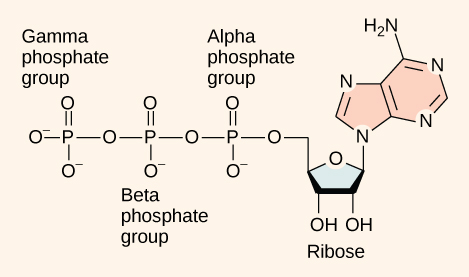6.1 Adenosine Triphosphate (ATP)
The Common Energy Molecule
To perform daily tasks and participate in physical activity, the body requires energy that we get from consuming food. Once consumed, food is broken down by our digestive system and converted into a universal form of “free energy” that can be used for muscle contraction and other bodily functions we need to survive. The final form this “free energy” takes is a molecule called Adenosine Triphosphate (ATP).

Since the body requires ATP in such high demand, the body uses multiple methods to synthesize it. Here we will discuss two classes of energy systems that help to produce ATP: the Anaerobic System and the Aerobic System.
“ATP in Living Systems” from Introduction to Exercise Science for Fitness Professionals by Amanda Shelton is licensed under a Creative Commons Attribution 4.0 International License, except where otherwise noted.

